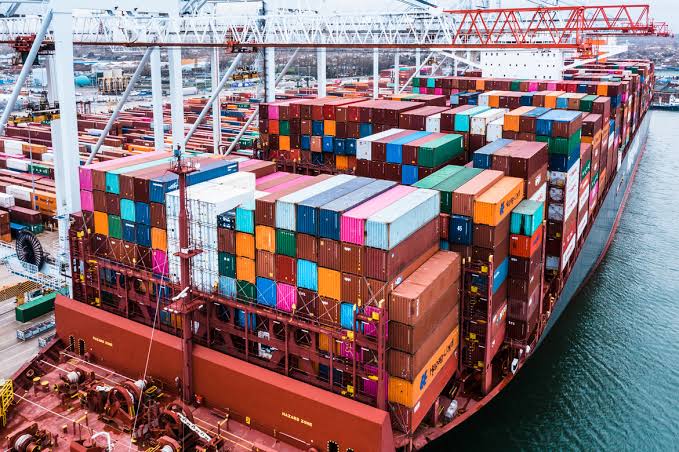Nigerian importers, exporters and other businessmen are in for a tougher year 2024 as the country’s international trade facilitator, the Nigerian Customs Service (NCS) faces fresh pressure from the government to generate more income to aid the country’s debt servicing.
The Senate on Monday, told the Comptroller-General of Customs, Adewale Adeniyi that the N5.079 trillion 2024 revenue target of the agency would be reviewed upwards from the second half of the year to help the country pay her suffocative debts and save her from further borrowings.
Chairman, Senate Committee on Customs, Isah Jibrin, during a meeting with the Customs boss and top management of the Service said Nigeria was saddled with heavy debts and the Customs represented a lead source of government revenue to help her out of debts.
Jibrin said: “Nigeria is saddled with lot of debt obligations and we need to wriggle ourselves out of that trap and one of the ways to do that is internally generated revenue.
“Customs is one of the major providers of internally generated revenue and as it is today, we expect them to play one of the major roles in this drive to reduce our debt burden.
“We need to pay off what we are owing now and minimise additional loans we are going to take.
“Customs is in a very good position, if they are able to block all perceived leakages, they should be able to generate significant amount of income that will enable Nigeria get out of debt at least partially.”
However, the Kogi Ea st Senator explained that the concessions given to some sectors of the economy, especially, agriculture, was to encourage those who are into agricultural services, solid minerals and those whose services have direct impact on the economy.
st Senator explained that the concessions given to some sectors of the economy, especially, agriculture, was to encourage those who are into agricultural services, solid minerals and those whose services have direct impact on the economy.
He said: “If somebody is bringing agricultural equipment into the economy and you try to take something out of that person in a way of import duty, that will discourage the person and that is what we are saying. It is not that anybody took that money or Customs compromised in the course of their services.
“Concessions were in the interest of Nigeria to encourage importers who are going into specific areas in the economy. There is a tradeoff here between importers and the country, particularly the things you think you are generating.”
The Customs CG had earlier told the lawmakers that the Service was seeking approval from government to allow them give waivers to owners of smuggled cars to allow them regularise their payment of Customs duties.
He said the approval if given, would enable owners of smuggled vehicles about three months within which they could regularise their documents with the NCS.
“If the approval is obtained by the NCS, owners of smuggled vehicles could within three months, that they are in possession of vehicles that were illegally imported into the country or that have not paid duties, have this opportunity to go to Customs House for assessment and payment of duties,” Adeniyi explained.
Amidst the new pressure on the Customs to generate more revenue, The Nigerian Economy recalls that the service could not meet its 2023 revenue target. The Customs fell short of about N400 billion out of its N3.7 trillion revenue target for 2023.
The Comptroller General of Customs had blamed the cash crunch, naira redesign and the general elections for the failure of the Nigeria Customs Service (NCS) to meet its 2023 revenue target.

The NCS collected a total of N3.202 trillion from January to December 2023, which showed over N400 billion negative variance below target due to the factors listed by the Customs boss.
Also, goods and contrabands with a total duty paid value of N16 trillion were seized from traders in 2023. With the fresh pressure now mounting on the service to generate more money for government in 2024, value of seizures for the year could be higher than that of 2023, thereby causing a tougher business environment for traders.
With the current economic hardship in the country, it is even harder to meet the 2024 target of N5 trillion, an amount the Senate said would be raised in June to ensure that Customs plays an adequate role in helping the country pay her debts.
In September 2023, the Debts Management Office said Nigeria’s public debt stock which includes external and domestic debt stood at N87. 38 trillion ($113.42 billion) from N49. 85 trillion ($ 108.30 billion) in Q1 2023, indicating a growth rate of 75.27% on a quarter-on-quarter basis.
Despite a dangerous stoppage of payment of subsidy on premium motor spirit (fuel) by the Bola Tinubu administration in June 2023, the country is also currently struggling to clear about $7 billion foreign exchange backlog.
During the former President Muhammadu Buhari tenure, between January and June 2023, N560 billion was budgeted for fuel subsidy monthly, amounting to $3.6 billion was for fuel subsidy payments for January to June 2023. The Tinubu administration is yet to do anything with funds saved from fuel subsidy payment scrapping seven months after stopping the fuel subsidy regime.


